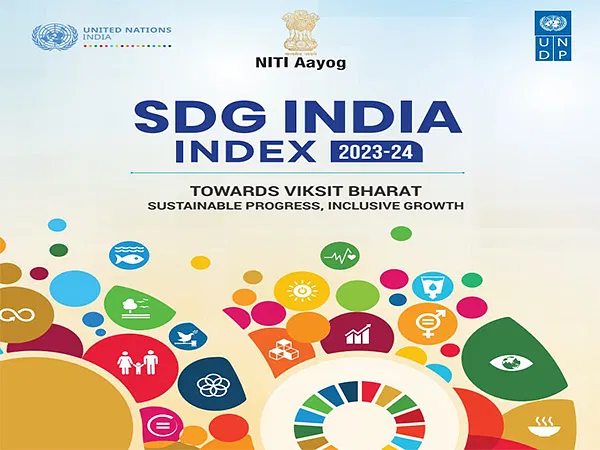On July 12, 2024, NITI Aayog unveiled the 4th edition of the Sustainable Development Goals (SDG) India Index for 2023-24 in New Delhi. India’s overall SDG score improved from 66 in 2020-21 to 71 in 2023-24, driven by progress in poverty reduction, economic growth, climate action, and life on land.
Contents
Top and Bottom Performers
- Top States: Kerala retained its top rank, sharing the spot with Uttarakhand, both scoring 79 points.
- Lowest States: Bihar ranked the lowest with 57 points, followed by Jharkhand (62) and Nagaland (63).
- Union Territories: Chandigarh led with 77 points, followed by Jammu & Kashmir and Puducherry (74 each), Andaman & Nicobar Islands, and Delhi (70 each).
Launch Event Details
- Event: The index was launched by Suman Bery, Vice Chairperson of NITI Aayog, attended by key dignitaries including B.V.R. Subrahmanyam (CEO, NITI Aayog), Shombi Sharp (UN Resident Coordinator in India), and others.
Overview of SDG India Index 2023-24
- Indicators: The index measured progress on 113 indicators aligned with the Ministry of Statistics and Programme Implementation’s (MoSPI) National Indicator Framework (NIF).
- Scoring Categories: States and UTs were scored on 16 SDGs, ranging from 0-100. A score of 100 indicates achievement of 2030 targets. Categories include Aspirant (0-49), Performer (50-64), Front-Runner (65-99), and Achiever (100).
National Progress Highlights
- Overall Improvement: Significant advancements were seen in Goals 1 (No Poverty), 8 (Decent Work and Economic Growth), and 13 (Climate Action), all now in the ‘Front Runner’ category.
- State/UT Performance: 32 states/UTs scored between 65 and 99, up from 22 in the previous edition. Uttar Pradesh showed the fastest improvement, increasing its score by 25 points since 2018.
Top States and UTs for Specific Goals
- No Poverty: Tamil Nadu (States), Dadra and Nagar Haveli and Daman & Diu (UTs)
- Zero Hunger: Kerala (States), Puducherry (UTs)
- Good Health & Well Being: Gujarat (States), Delhi (UTs)
- Quality Education: Kerala (States), Delhi (UTs)
- Gender Equality: Nagaland (States), Lakshadweep (UTs)
- Clean Water & Sanitation: Goa (States), Andaman & Nicobar Islands (UTs)
- Affordable and Clean Energy: Andhra Pradesh (States), Andaman & Nicobar Islands (UTs)
- Decent Work and Economic Growth: Himachal Pradesh (States), Ladakh (UTs)
- Industry, Innovation and Infrastructure: Goa (States), Puducherry (UTs)
- Reduced Inequality: Goa (States), Puducherry (UTs)
- Sustainable Cities and Communities: Maharashtra (States), Chandigarh (UTs)
- Responsible Consumption & Production: Tripura (States), J&K (UTs)
- Climate Action: Sikkim (States), Chandigarh (UTs)
- Life Below Water: West Bengal (States)
- Life on Land: Jharkhand and Tripura (States), Dadra and Nagar Haveli and Daman & Diu (UTs)
- Peace, Justice and Strong Institutions: Gujarat (States), Ladakh (UTs)
Government Initiatives Supporting SDG Achievements
- Housing: Over 4 crore houses built under PM Awas Yojana (PMAY)
- Sanitation: 11 crore toilets and 2.23 lakh community sanitary complexes in rural areas
- LPG Connections: 10 crore LPG connections under Pradhan Mantri Ujjwala Yojana (PMUY)
- Food Security: 80 crore people covered under the National Food Security Act (NFSA)
- Healthcare: Ayushman Bharat-Pradhan Mantri Jan Arogya Yojana covered over 30 crore beneficiaries
About the Sustainable Development Goals (SDGs) by UNDP
The Sustainable Development Goals (SDGs) were adopted by the United Nations in 2015 as a universal call to action to end poverty, protect the planet, and ensure peace and prosperity for all by 2030. The 17 SDGs are integrated, recognizing that action in one area will affect outcomes in others, and that development must balance social, economic, and environmental sustainability.
- No Poverty (Goal 1): End poverty in all its forms everywhere.
- Zero Hunger (Goal 2): End hunger, achieve food security and improved nutrition, and promote sustainable agriculture.
- Good Health and Well-being (Goal 3): Ensure healthy lives and promote well-being for all at all ages.
- Quality Education (Goal 4): Ensure inclusive and equitable quality education and promote lifelong learning opportunities for all.
- Gender Equality (Goal 5): Achieve gender equality and empower all women and girls.
- Clean Water and Sanitation (Goal 6): Ensure availability and sustainable management of water and sanitation for all.
- Affordable and Clean Energy (Goal 7): Ensure access to affordable, reliable, sustainable, and modern energy for all.
- Decent Work and Economic Growth (Goal 8): Promote sustained, inclusive, and sustainable economic growth, full and productive employment, and decent work for all.
- Industry, Innovation, and Infrastructure (Goal 9): Build resilient infrastructure, promote inclusive and sustainable industrialization, and foster innovation.
- Reduced Inequality (Goal 10): Reduce inequality within and among countries.
- Sustainable Cities and Communities (Goal 11): Make cities and human settlements inclusive, safe, resilient, and sustainable.
- Responsible Consumption and Production (Goal 12): Ensure sustainable consumption and production patterns.
- Climate Action (Goal 13): Take urgent action to combat climate change and its impacts.
- Life Below Water (Goal 14): Conserve and sustainably use the oceans, seas, and marine resources for sustainable development.
- Life on Land (Goal 15): Protect, restore, and promote sustainable use of terrestrial ecosystems, sustainably manage forests, combat desertification, and halt and reverse land degradation and halt biodiversity loss.
- Peace, Justice, and Strong Institutions (Goal 16): Promote peaceful and inclusive societies for sustainable development, provide access to justice for all, and build effective, accountable, and inclusive institutions at all levels.
- Partnerships for the Goals (Goal 17): Strengthen the means of implementation and revitalize the Global Partnership for Sustainable Development.


